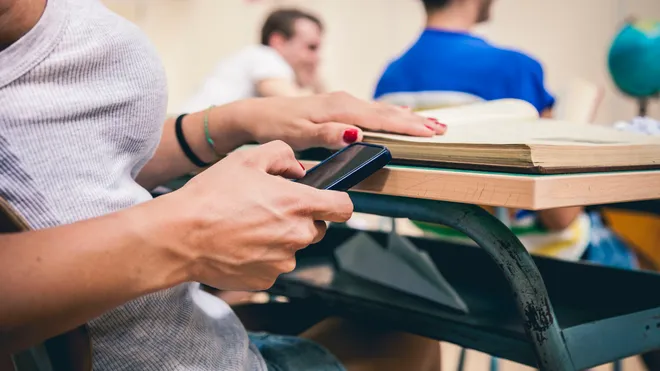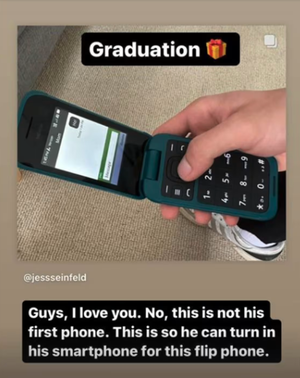Do smartphone bans work if parents push back?
As many kids head back to school this year to more strict cellphone bans, some of the biggest pushback against removing smartphones from classrooms comes from parents.
“What if there’s a school shooting,” an anonymous member of the Parenting in a Tech World Facebook Group asks. “We decided it is time to get (our 10-year-old) a phone so we can track her and communicate with her while she is away from us,” comments another mom on a separate thread in the group.
A National Parents Union poll earlier this year shows that while most parents are worried about some of the harms associated with smartphones − especially social media's influence on kids − they want their children to have phones in class in case of an emergency.
“Many parents in our group are lashing out about this; they want their child to be able to reach them – any time at school,” Jodie Sherrill, one of Parenting in a Tech World's main moderators, writes in an email.
PITW is a private group run and managed by Bark, a parental controls and message monitoring company that sells an app, a kid-specific phone and an in-home filtering device. As Bark’s director of community, Sherill sees firsthand that phones in schools are among parents’ top concerns.

“A HUGE debate that comes up in our group is the fear of school shootings. Many parents argue they want their child to reach them in that tragic event; the parent wants to reach the child; perhaps they can help get them out, or even just to say “I love you” one last time,” she says.
Deputy Dave Gomez, a school resource officer in Colorado, and many other school safety experts say cellphones are more of a distraction than potential lifeline during such emergencies.
That point hits close to home for me. There was an active shooter outside my daughter’s high school her sophomore year. No kids were hurt, but the minute I got the alert that her school was locked down because of a crazy guy with a gun, I was scared out of my mind and had to fight every instinct in my being not to rush down to her school and try to find her.
I get it. The fear is real. I was an absolute wreck until I got a text from her (after her teachers gave the all-clear to use their phones) saying she was OK.
Still, educators and law enforcement alike say it’s better for parents to manage their anxiety than to remain tethered by tech during the school day.
But, parents: Teachers report you’re getting carried away
In Slate, high school teacher Liz Schulman wrote an eye-opening account of what it’s like to try to get kids to put phones away when they come to class these days. “Many parents are so tightly tethered to their kids, it’s as though they’re sitting in our classrooms with us,” she says. “Parents want always-on access to their kids.”
Two ninth graders in Schulman’s class told her that their parents expected them to check in during every class and worried if they sent their child a text during the school day and didn’t get an immediate response.
“You do get a lot of pushback,” Gomez says. “Parents want that 24/7 connection with their kids, and they don’t believe their kids can make choices, which doesn’t help them grow up.”
Do cellphone bans at schools work?
School districts that take a stronger stance on keeping cellphones out of the classroom report less bullying, increased student engagement and even increased eye contact and face-to-face conversations.
“Just take the temptation away. I work in a high school that instituted a ban last year, and it went much better than expected,” says mom and school paraeducator Stephanie Carlson in Bedford, New Hampshire.
But bans are only as effective as the teachers and parents who enforce them. Nearly 80% of schools have had policies against the use of phones in classrooms for years now, but many leave it up to individual teachers to decide the actual day-to-day rules.
Carlson says the teachers who made their classes strict no-phone zones − and were clear and direct about it from day one − had the most success. She said it was apparent that removing the distraction altogether by tucking phones and smartwatches into designated cubbies or secure pouches worked better than just asking kids to keep phones out of sight.
“The kids knew what to expect, and it was no big deal at all. The kids who were able to keep their phones were completely distracted. The phone was in the backpack, but they were constantly looking down on it, or we could see them sending text messages on their watch. I mean, you have your phone as an adult sitting next to you, and we tell you, 'Don't touch it.' That's all I'm going to think about is touching it, right?”
Of course, kids being kids, some students sneak around and break the rules, like turning in older “dummy” phones versus their actual smartphones at the start of class.
One teacher friend of mine said trying to police the classroom for sneaky phone use is like playing whack-a-mole. Half the time, kids get in trouble or have their phones confiscated, he said, and parents intervene and threaten the school.
“I probably spend the equivalent of a full instructional day policing phones, and I won’t even get into students using phones/watches to cheat via text, cameras and AI,” writes another teacher in a group thread on Reddit. “Until parents get on board, this is a lose-lose.”
School is no place for cellphones:See how some states are cracking down
Are there alternatives to keep in touch with kids, minus the danger and distractions?
This is another top question every single day at that PITW Facebook Group I mentioned earlier. There are a lot of recommendations for Bark products within the group, since that company runs the account. But it’s still a precious resource for parents to ask questions and share advice across all devices and experiences.
“We need a dumb phone. Something compatible with Verizon that has podcast capabilities, if possible, but no internet web browser or social media apps. Just the basics,” posts an Anonymous member.
“I got my kiddo a Straight Talk flip phone,” one parent writes in the group. “No app compatibility and costs $20 every 90 days to load (minutes) and texting.”
“Same!” another parent replies. “My kid has a Verizon flip phone I got from Walmart. It still has a web browser, so maybe look at the Pinwheel phones instead?”
Return of the flip phone
Support and recommendations for flip phones continue to grow among the group and in popular culture.
Jessica Seinfeld, wife of famed comedian Jerry Seinfeld, recently shared on Instagram that the couple gifted their son Shepherd a flip phone. She said she chose that gift in the hopes he will use it instead of a smartphone as a freshman at Duke this fall. Seinfeld also posted that she wishes she would have waited until he was older to give him a smartphone.

"Many of you have asked if this is his first phone — I wish! If I knew then what I know now, I would’ve waited until age 14 to give him a smartphone (he got handed down an old one at age 12, for the bus ride to school in the Bronx)," she wrote on Instagram.
I've covered the rise of flip phones quite a bit, but until this year, they were super-niche — a trend for hipsters and tech heads who needed a break from constant notifications. Now, they’re a valuable go-to for parents trying to break their children out of a device-induced haze.
While no single handset or set of parental controls is easy, perfect or inexpensive, a few options rise to the top for parents looking for a way to stay connected without the distractions and pitfalls of all-access smartphones. You can read all about those in my next column.
Jennifer Jolly is an Emmy Award-winning consumer tech columnist and on-air correspondent. The views and opinions expressed in this column are the author's and do not necessarily reflect those of USA TODAY. Contact her atJJ@Techish.com.
Disclaimer: The copyright of this article belongs to the original author. Reposting this article is solely for the purpose of information dissemination and does not constitute any investment advice. If there is any infringement, please contact us immediately. We will make corrections or deletions as necessary. Thank you.







